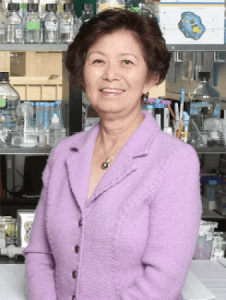Effect of Monoamine oxidase A (MAOA) inhibitors on androgen‐sensitive and castration‐resistant prostate cancer cells
The Prostate
Shikha Gaur, Mitchell E Gross, Chun‐Peng Liao, Bin Qian, Jean C Shih
2019
Monoamine oxidase A (MAOA) is best known for its role in neuro‐transmitter regulation. Monoamine oxidase inhibitors are used to treat atypical depression. MAOA is highly expressed in high grade prostate cancer and modulates tumorigenesis and progression in prostate cancer. Here, we investigated the potential role of MAOA inhibitors (MAOAIs) in relation to the androgen receptor (AR) pathway and resistance to antiandrogen treatment in prostate cancer.nhibitors are used to treat atypical depression."
Read More
Gene-environment interactions in antisocial behavior are mediated by early-life 5-HT2A receptor activation
Neuropharmacology
Sean C Godar, Laura J Mosher, Simona Scheggi, Paola Devoto, Kelly M Moench, Hunter J Strathman, Cori M Jones, Roberto Frau, Miriam Melis, Carla Gambarana, Brent Wilkinson, M Graziella DeMontis, Stephen C Fowler, Marcelo P Coba, Cara L Wellman, Jean C Shih, Marco Bortolato
2019
The ontogeny of antisocial behavior (ASB) is rooted in complex gene-environment (G×E) interactions. The best-characterized of these interplays occurs between: a) low-activity alleles of the gene encoding monoamine oxidase A (MAOA), the main serotonin-degrading enzyme; and b) child maltreatment. The purpose of this study was to develop the first animal model of this G×E interaction, to help understand the neurobiological mechanisms of ASB and identify novel targets for its therapy. Maoa hypomorphic transgenic mice were exposed to an early-life stress regimen consisting of maternal separation and daily intraperitoneal saline injections and were then compared with their wild-type and non-stressed controls for ASB-related neurobehavioral phenotypes. Maoa hypomorphic mice subjected to stress from postnatal day (PND) 1 through 7 – but not during the second postnatal week - developed overt aggression, social deficits and abnormal stress responses from the fourth week onwards. On PND 8, these mice exhibited low resting heart rate - a well-established premorbid sign of ASB – and a significant and selective up-regulation of serotonin 5-HT2A receptors in the prefrontal cortex. Notably, both aggression and neonatal bradycardia were rescued by the 5-HT2 receptor antagonist ketanserin (1–3 mg kg−1, IP), as well as the selective 5-HT2A receptor blocker MDL-100,907 (volinanserin, 0.1–0.3 mg kg−1, IP) throughout the first postnatal week. These findings provide the first evidence of a molecular basis of G×E interactions in ASB and point to early-life 5-HT2A receptor activation as a key mechanism for the ontogeny of this condition.
Read More
Gene-Environment Interactions in Antisocial Behavior Are Mediated by Early-Life 5-HT2A Receptor Activation
Neuropharmacology
Godar SC, Mosher LJ, Scheggi S, Devoto P, Moench KM, Strathman HJ, Jones CM, Frau R, Melis M, Gambarana C, Wilkinson B, DeMontis MG, Fowler SC, Coba MP, Wellman CL, Shih JC, Bortolato M
2019
The ontogeny of antisocial behavior (ASB) is rooted in complex gene-environment (G×E) interactions. The best-characterized of these interplays occurs between: a) low-activity alleles of the gene encoding monoamine oxidase A (MAOA), the main serotonin-degrading enzyme; and b) child maltreatment. The purpose of this study was to develop the first animal model of this G×E interaction, to help understand the neurobiological mechanisms of ASB and identify novel targets for its therapy. Maoa hypomorphic transgenic mice were exposed to an early-life stress regimen consisting of maternal separation and daily intraperitoneal saline injections and were then compared with their wild-type and non-stressed controls for ASB-related neurobehavioral phenotypes. Maoa hypomorphic mice subjected to stress from postnatal day (PND) 1 through 7 - but not during the second postnatal week - developed overt aggression, social deficits and abnormal stress responses from the fourth week onwards. On PND 8, these mice exhibited low resting heart rate - a well-established premorbid sign of ASB - and a significant and selective up-regulation of serotonin 5-HT2A receptors in the prefrontal cortex. Notably, both aggression and neonatal bradycardia were rescued by the 5-HT2 receptor antagonist ketanserin (1-3 mg kg-1, IP), as well as the selective 5-HT2A receptor blocker MDL-100,907 (volinanserin, 0.1-0.3 mg kg-1, IP) throughout the first postnatal week. These findings provide the first evidence of a molecular basis of G×E interactions in ASB and point to early-life 5-HT2A receptor activation as a key mechanism for the ontogeny of this condition.
Read More
SMAD2 As Risk Locus for Human Left Atrial Isomerism Detected by Mother-Fetus-Pair Exome Sequencing and Imaging Studies
Ultrasound in Obstetrics & Gynecology
Shih JC, Ma GC, Cheng WC, Chen CY, Wu WJ, Chen M
2019
Read More
R1 Regulates Prostate Tumor Growth and Progression By Transcriptional Suppression of the E3 Ligase HUWE1 to Stabilize c-Myc
Molecular Cancer Research
Tzu-Ping Lin, Jingjing Li, Qinlong Li, Xiangyan Li, Chunyan Liu, Ni Zeng, Jen-Ming Huang, Gina Chia-Yi Chu, Chi-Hung Lin, Haiyen E Zhau, Leland WK Chung, Boyang Jason Wu, Jean C Shih
2018
Prostate cancer is a prevalent public health problem, especially because noncutaneous advanced malignant forms significantly affect the lifespan and quality of life of men worldwide. New therapeutic targets and approaches are urgently needed. The current study reports elevated expression of R1 (CDCA7L/RAM2/JPO2), a c-Myc–interacting protein and transcription factor, in human prostate cancer tissue specimens. In a clinical cohort, high R1 expression is associated with disease recurrence and decreased patient survival. Overexpression and knockdown of R1 in human prostate cancer cells indicate that R1 induces cell proliferation and colony formation. Moreover, silencing R1 dramatically reduces the growth of prostate tumor xenografts in mice. Mechanistically, R1 increases c-Myc protein stability by inhibiting ubiquitination and proteolysis through transcriptional suppression of HUWE1, a c-Myc–targeting E3 ligase, via direct interaction with a binding element in the promoter. Moreover, transcriptional repression is supported by a negative coexpression correlation between R1 and HUWE1 in a prostate cancer clinical dataset. Collectively, these findings, for the first time, characterize the contribution of R1 to prostate cancer pathogenesis.
Read More


